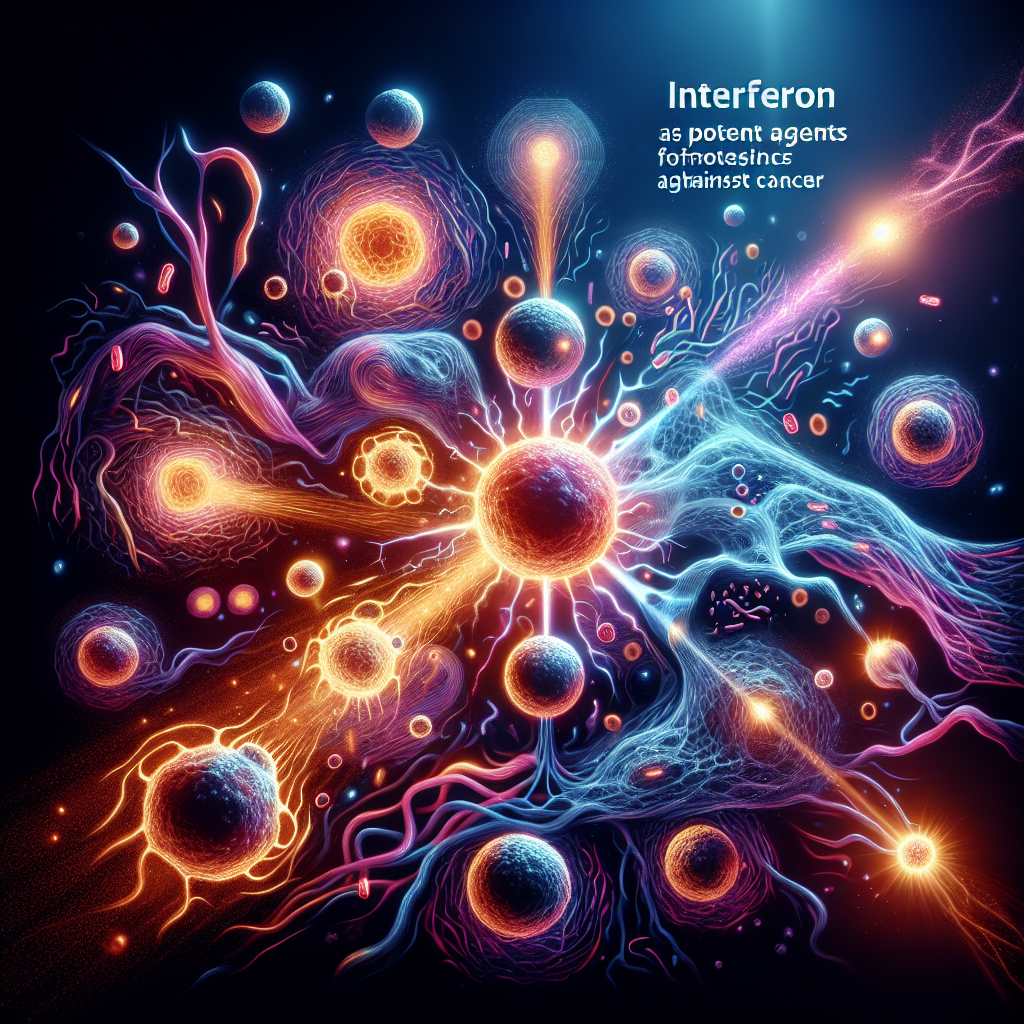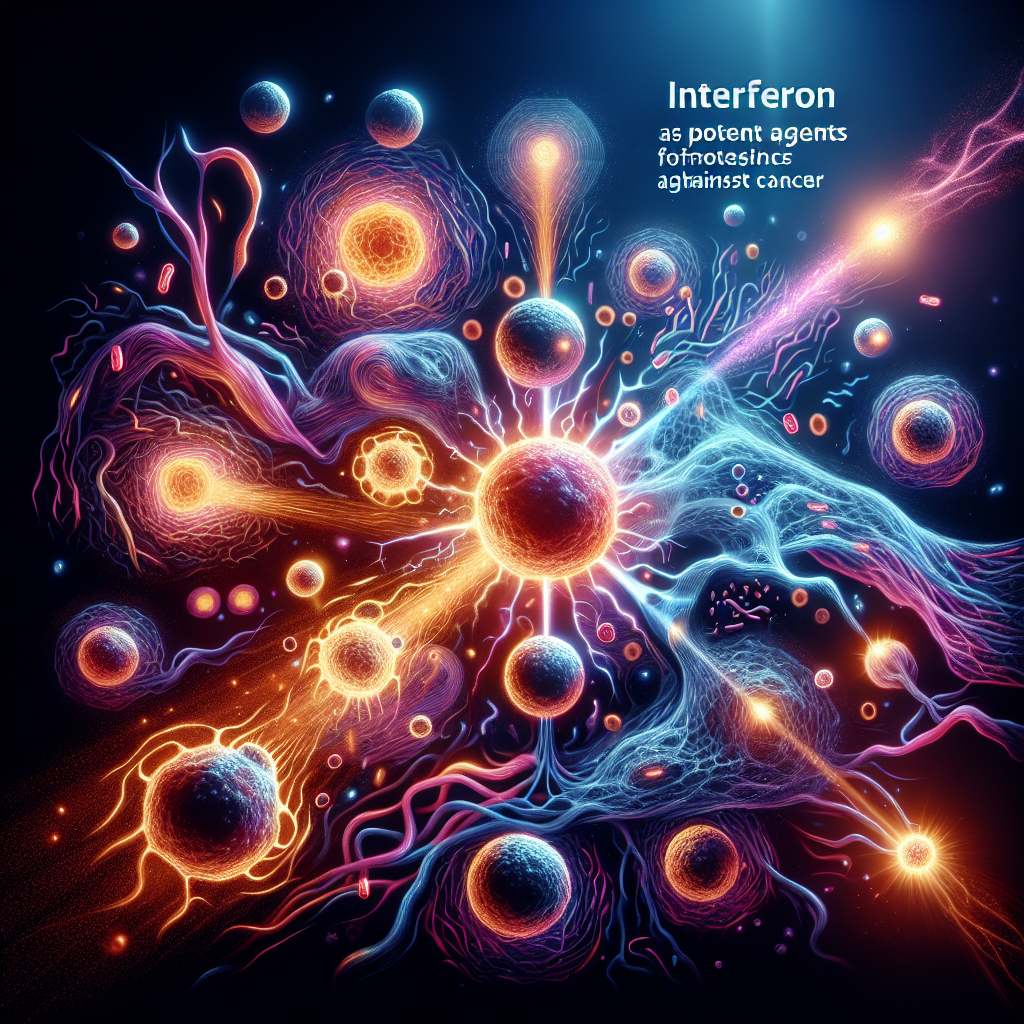In the fight against cancer, the body relies on a powerful defense mechanism called interferons. These remarkable proteins play a crucial role in bolstering the immune system and impeding the growth of cancer cells. By stimulating the production of immune cells and activating a cascade of anti-tumor responses, interferons serve as a valuable ally in the battle against this formidable disease. In this article, we will explore the fascinating world of interferons and their remarkable ability to enhance the body’s defense against cancer.

Overview of Interferons
What are interferons?
Interferons are a group of proteins that play a vital role in the immune system’s response to infections, tumors, and other harmful agents. They are produced by various cells in the body, including immune cells, when they detect the presence of these threats. Interferons work by signaling neighboring cells to heighten their defense mechanisms, thus enhancing the body’s ability to fight off the invaders.
Types of interferons
There are three main types of interferons: alpha, beta, and gamma. Each type is produced by different cell types and has distinct functions within the immune system. Alpha and beta interferons are primarily involved in controlling viral infections, while gamma interferons are important for regulating immune responses and are particularly effective against certain types of cancer.
Interferons and Cancer
Role of interferons in cancer defense
Interferons play a crucial role in the body’s defense against cancer cells. They help to suppress tumor growth and prevent cancer from spreading to other parts of the body. Interferons also enhance the presentation of cancer cell antigens, making them more recognizable to the immune system, which can lead to the destruction of these abnormal cells.
How do interferons work against cancer?
Interferons work against cancer in several ways. First, they activate immune cells, such as natural killer (NK) cells and cytotoxic T cells, which are responsible for recognizing and eliminating cancer cells. Secondly, interferons inhibit the growth of blood vessels that supply nutrients to tumors, starving them of the resources they need to survive and grow. Finally, interferons can also promote apoptosis, a process in which cancer cells self-destruct, further inhibiting tumor growth.
Effects of interferons on tumor cells
Interferons have various effects on tumor cells. They can induce tumor cell differentiation, making them less aggressive and more susceptible to immune attack. Interferons also enhance the expression of proteins involved in the regulation of cell growth, making tumor cells more vulnerable to the effects of chemotherapy and other cancer treatments. Additionally, interferons can stimulate the production of molecules that inhibit the growth of tumor cells and promote their destruction by immune cells.
Interferon Therapies
Different types of interferon therapies
Interferon therapies are medical treatments that involve the use of synthetic interferon proteins to simulate the body’s natural immune response. There are several types of interferon therapies used in cancer treatment, including interferon-alpha, interferon-beta, and pegylated interferons. Each type has its unique characteristics and is administered based on the specific type and stage of cancer.
Administration of interferon therapies
Interferon therapies can be administered in different ways, depending on the specific treatment plan and the patient’s condition. They can be given as injections, either subcutaneously or intravenously, or in the form of topical creams or gels for certain skin cancers. The frequency and duration of treatment may vary, ranging from a few weeks to several months, depending on the individual’s response and tolerability.
Benefits and limitations of interferon therapies
Interferon therapies have shown significant benefits in the treatment of certain types of cancer. They have been particularly effective against melanoma, renal cell carcinoma, and certain types of leukemia. Interferon therapy can help delay cancer progression, improve patient survival rates, and reduce the risk of recurrence. However, not all cancer types respond equally well to interferon therapy, and some patients may experience side effects that can impact their quality of life.
Immune System Activation
Interferon-mediated immune system activation
Interferons play a crucial role in activating the body’s immune system to recognize and eliminate cancer cells. When interferons are released in response to cancerous growth, they stimulate the production of other immune signaling molecules. These molecules, in turn, activate various components of the immune system, such as white blood cells, to target and destroy the cancer cells.
Interferons and natural killer cells
Natural killer (NK) cells are a type of lymphocyte that possesses powerful cytolytic activity against tumor cells. Interferons enhance the activity of NK cells by increasing their responsiveness and cytotoxic potential. This interaction between interferons and NK cells is crucial for the body’s defense against cancer, as NK cells can directly recognize and kill cancer cells without the need for prior sensitization.
Interferons and cytotoxic T cells
Cytotoxic T cells, also known as CD8+ T cells, are another important component of the immune system involved in cancer cell recognition and destruction. Interferons enhance the activation and function of cytotoxic T cells, enabling them to recognize cancer cells more effectively and initiate their destruction. This activation of cytotoxic T cells by interferons plays a significant role in tumor control and the body’s immune response to cancer.
Interferons in Combination Therapies
Enhancing the effectiveness of other cancer treatments
Interferons are frequently used in combination with other cancer treatments to enhance their effectiveness. For example, when combined with chemotherapy, interferons can increase the sensitivity of cancer cells to the cytotoxic effects of the drugs. Similarly, in combination with immunotherapy, interferons can augment the immune system’s response to cancer cells and improve the overall treatment outcome.
Interferons and chemotherapy
When used in combination with chemotherapy, interferons can enhance the anti-tumor effects of chemotherapy drugs. Interferons can sensitize cancer cells to chemotherapy-induced cell death, making them more susceptible to the cytotoxic effects of the drugs. This combination therapy approach has shown promise in improving response rates and overall survival in certain cancer types.
Interferons and immunotherapy
Immunotherapy is a type of cancer treatment that stimulates the body’s immune system to recognize and attack cancer cells. Interferons can be used in conjunction with immunotherapy agents to enhance their efficacy. Interferons can increase the expression of immune checkpoint proteins on cancer cells, making them more susceptible to immunotherapy drugs that target these checkpoints. This combination therapy approach has shown promising results in improving response rates and prolonging survival in certain cancers.
Side Effects and Risks
Common side effects of interferon therapies
Interferon therapies can cause various side effects, which can vary depending on the individual and the specific treatment regimen. Common side effects include flu-like symptoms such as fever, chills, fatigue, and muscle aches. Other side effects may include nausea, vomiting, depression, changes in blood cell counts, and liver toxicity. These side effects are usually temporary and can be managed with supportive care.
Long-term effects of interferon treatments
In some cases, long-term use of interferon therapies can lead to certain side effects that persist even after the treatment has ended. These may include thyroid dysfunction, autoimmune disorders, and neuropsychiatric symptoms. It is important for patients undergoing long-term interferon therapy to be closely monitored by their healthcare providers and to report any new or worsening symptoms promptly.
Management of side effects
The management of side effects associated with interferon therapies involves a multidisciplinary approach. Close monitoring, dose adjustments, and supportive care measures such as anti-nausea medications, pain relievers, and psychological support can help alleviate side effects and improve patient comfort. Open communication between patients and healthcare providers is essential to ensure timely intervention and appropriate management of side effects.
Clinical Trials and Research
Latest advancements in interferon research
Ongoing research in the field of interferon therapy has revealed promising advancements. Scientists are exploring ways to enhance the effectiveness and safety of interferon treatments through the development of targeted delivery systems and novel combination therapies. Additionally, there is a growing interest in understanding the molecular mechanisms behind interferon resistance in certain cancer types, which can lead to the development of strategies to overcome this resistance.
Future prospects of interferon-based therapies
Interferon-based therapies hold significant potential in the future of cancer treatment. As researchers continue to unravel the complex interactions between immune cells and cancer cells, new therapeutic strategies involving interferon modulation are being explored. The development of personalized medicine approaches that can tailor interferon therapies to individual patients’ specific characteristics holds promise for improving treatment outcomes and minimizing side effects.
Considerations for Interferon Treatment
Patient selection for interferon therapies
The selection of patients for interferon therapies involves a careful evaluation of various factors, including the type and stage of cancer, overall health status, and treatment goals. In some cases, specific genetic biomarkers may help identify patients who are more likely to benefit from interferon-based therapies. Individualized treatment plans should be developed in collaboration with the patient’s healthcare team to ensure optimal treatment outcomes.
Monitoring and follow-up care
Regular monitoring and follow-up care are essential for patients undergoing interferon therapy. This includes frequent check-ups, blood tests, and imaging studies to assess treatment response and evaluate for any potential adverse effects. Communication between patients and healthcare providers is crucial during this period to address any concerns, adjust treatment as needed, and optimize the patient’s well-being.
Cost and availability of interferon treatments
As with any medical treatment, the cost and availability of interferon therapies can vary depending on geographic location, healthcare system, and insurance coverage. These factors may influence the accessibility and affordability of interferon treatments for some patients. It is important for patients to discuss these considerations with their healthcare providers and explore available resources for financial assistance, if needed.
Conclusion
Interferons have emerged as instrumental players in the fight against cancer, with their ability to enhance the body’s defense mechanisms and inhibit tumor growth. Through their activation of immune cells and modulation of cell signaling pathways, interferons have demonstrated significant efficacy in various cancers and in combination with other treatment modalities. Ongoing research and advancements in interferon-based therapies hold promise for the future of cancer treatment, as personalized approaches and targeted delivery systems continue to evolve. With continued exploration and understanding of interferon-based therapies, they have the potential to revolutionize cancer treatment and improve patient outcomes.






